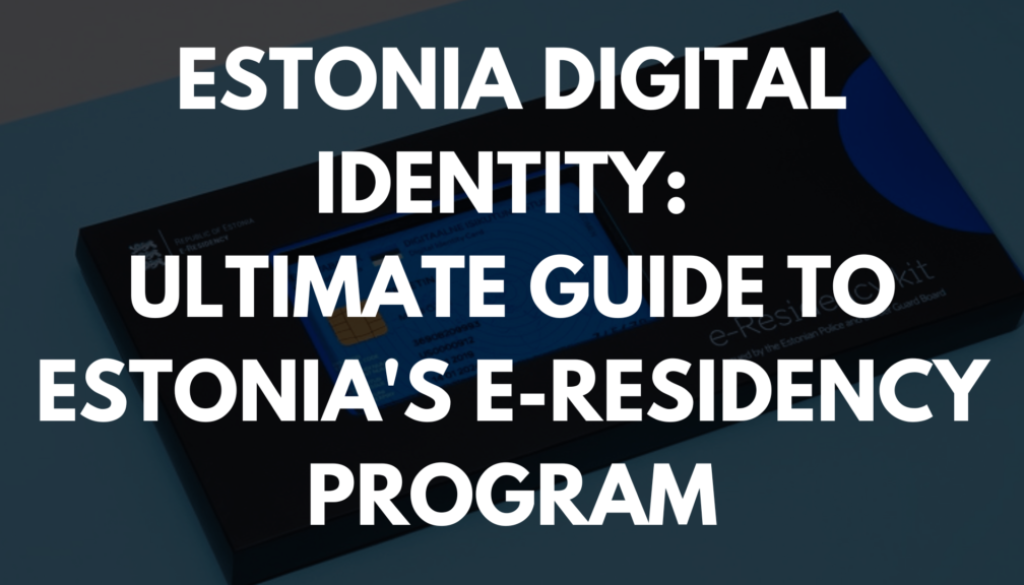Estonia Digital Identity: Ultimate Guide to Estonia’s E-Residency Program
Last Updated on 19. Dec 2024 by b2bexport
Imagine a world where you can manage your business seamlessly from any corner of the globe, all while enjoying the benefits of being part of the EU market.
Estonia, the northernmost of the three Baltic states, located in northeastern Europe, makes this a reality with its groundbreaking e-residency program. Launched in 2014, this innovative digital identity initiative allows entrepreneurs and business owners worldwide to establish and manage an EU-based company without setting foot in Estonia. Whether you’re a digital nomad, a startup founder, or an established business owner looking to expand, Estonia’s e-residency program offers a unique and powerful solution.
Let’s explore how this program works and why it could be the game-changer you’ve been looking for.
What is E-Residency?
E-residency is a cutting-edge program that provides a government-issued digital ID to non-Estonians, granting them access to Estonia’s advanced e-services.
Independent Estonia emerged after the Soviet occupation and has since transformed into a digital nation, showcasing its resilience and innovation. This digital identity enables you to set up and manage a business remotely within Estonia’s robust digital infrastructure. The vision behind e-residency is to create a borderless digital nation where location is no longer a barrier to entrepreneurship.
Estonia, often referred to as the “Silicon Valley of Europe,” has paved the way for a new era of global business with this pioneering initiative.
Benefits of E-Residency
Why should you consider becoming an e-resident of Estonia? Here are some compelling reasons:
1. Enhanced Credibility
Estonia is known for its advanced digital infrastructure and transparent business environment.
By becoming an e-resident, you can leverage the credibility that comes with being associated with a country that is a member of the European Union. This membership not only enhances business credibility but also provides access to a larger market and various economic benefits.
2. Establish and Manage a European Union-Based Company
With e-residency, you can easily establish and run a company that is based in Estonia but operates internationally.
This allows you to enjoy the benefits of being part of the EU market, including access to a large customer base and a stable regulatory environment.
3. Access to Estonia’s Digital Infrastructure Provided by the Estonian Government
Benefit from Estonia’s world-class digital services, including secure online banking, efficient payment processing, and legally recognized digital signatures.
These services streamline business operations, making it easier to manage your company from anywhere in the world.
4. Simplified Business Administration
Say goodbye to cumbersome paperwork and high administrative costs.
Estonia’s streamlined digital processes make business management a breeze, reducing overheads and freeing up your time to focus on growth and innovation.
5. Enhanced Credibility
Operating within the robust EU regulatory framework enhances your business’s credibility, making it more attractive to partners, investors, and customers.
Being part of the EU also provides a sense of stability and trustworthiness that is appealing in the global market.

6. Global Market Access
Leverage Estonia’s favorable business environment to reach new international markets and expand your global footprint.
The e-residency program makes it easier to navigate the complexities of cross-border trade and tap into the vast opportunities available in the EU and beyond.
7. Historical Context and Modern Governance
Estonia’s journey from Soviet rule to becoming an independent republic has shaped its current governance and innovation landscape.
The Estonian government has prioritized digital transformation, making Estonia a leader in digital identity and e-services. Estonia’s history as part of the Soviet Union and its subsequent independence have contributed to its unique position in Europe.
8. Geopolitical and Cultural Significance
Located on the northern coast of the Baltic Sea, Estonia’s strategic position has influenced its cultural and political development.
The country shares borders with Latvia and Russia and is in close proximity to Finland and Sweden. Estonia’s experience under Soviet occupation has shaped its modern identity and resilience, making it a model for digital governance.
9. Environmental and Industrial Context
Estonia is also known for its natural resources, such as oil shale, and its efforts to address climate change and environmental pollutants.
The Narva power plants and the construction industry are significant components of Estonia’s economy. Additionally, the country is actively engaged in discussions on climate change and aims to reduce pollutants emitted into coastal seawater and the Baltic Sea.
10. Social and Demographic Factors
Estonia’s population includes ethnic minorities, such as ethnic Russians, who contribute to the country’s diverse cultural fabric.
The official language is Estonian, and the country boasts a high urban population, particularly in the capital, Tallinn. Estonia’s educational and social systems are designed to support both the rural population and urban dwellers.
Who Can Apply for E-Residency?
The beauty of Estonia’s e-residency program is its inclusivity. Anyone from anywhere in the world can apply!
This program is especially beneficial for:
Freelancers and Digital Nomads
Enjoy the freedom to manage your business from anywhere in the world with ease.
E-residency provides a stable and efficient way to handle administrative tasks, allowing you to focus on what you do best.
Startups and Entrepreneurs in the Baltic States
Looking to establish a presence in the EU market?
E-residency provides a straightforward and cost-effective solution. With access to Estonia’s digital infrastructure and a supportive business environment, startups can thrive and scale rapidly.
Established Businesses
Expand your operations internationally without the need for a physical office in the EU.
E-residency allows established businesses to tap into new markets, forge partnerships, and increase their global reach.
Estonian Citizens
Estonian citizens also benefit from the program as it fosters international business connections and enhances the local economy.
Estonia, an independent republic that emerged after the Soviet occupation, is known for its innovative digital identity and robust market economy.
E-Residency Program’s Inclusivity
The program is open to individuals from all over the world, including those in East Estonia, Northern Estonia, and the northern coast regions.
Estonia, often referred to as the “Silicon Valley of Europe,” offers unparalleled digital services, making it an attractive option for entrepreneurs and business owners globally.
Global Reach and Local Impact
By offering e-residency, the Estonian government ensures that both local and international businesses can benefit from Estonia’s advanced digital infrastructure.
This initiative aligns with Estonia’s vision of being a leader in digital transformation within the European Union.
Historical and Geopolitical Context
Estonia’s journey from Soviet rule to becoming an independent republic has significantly influenced its current governance and innovation landscape.
The program supports the country’s goal of enhancing its position within the EU while maintaining strong historical ties with its past under Soviet Russia.
Environmental and Industrial Advantages
Estonia’s rich natural resources, including oil shale, and its commitment to addressing climate change, make it an ideal location for businesses focused on sustainability.
The Narva power plants and the construction industry are key sectors benefiting from Estonia’s digital advancements.
Social and Demographic Benefits
The program also supports Estonia’s diverse population, including ethnic Russians and other ethnic minorities.
The official language, Estonian, is central to the country’s identity, and the e-residency program helps integrate various cultural and demographic groups, enhancing Estonia’s global connectivity.
Strategic Position in Northeastern Europe
Located in northeastern Europe, Estonia’s strategic position on the Baltic Sea, near Lake Peipus, and its proximity to Finland, Sweden, and other European countries, further enhances its appeal as a hub for digital business.
The country’s inclusion in NATO and the EU underscores its commitment to international cooperation and security.
Political and Economic Stability
Estonia’s stable political environment, characterized by a unicameral parliament and a market economy, provides a secure foundation for businesses.
The country’s membership in the European Union and adherence to EU average standards ensures a reliable and predictable business environment.

Application Process
Applying for e-residency in Estonia is simple and straightforward.
Here’s a step-by-step guide to get you started: The Estonian government plays a crucial role in ensuring the integrity of the e-residency program through thorough background checks.
Step 1: Online Application
Head over to the official e-residency website and fill out the application form.
You’ll need to provide some personal details, including your name, contact information, and a brief motivation statement explaining why you want to become an e-resident of the Republic of Estonia.
Step 2: Submit Documents
Upload a scanned copy of your passport, a digital photo, and your motivation statement.
Make sure your documents are clear and meet the requirements specified on the website. Estonia’s digital infrastructure makes the submission process efficient and secure.
Step 3: Background Check
The Estonian police will conduct a background check to ensure all applicants are trustworthy and meet the eligibility criteria.
This process typically takes a few weeks. Estonia’s history of rigorous governance and its experience under Soviet rule ensure a high standard of security and trustworthiness.
Step 4: Collect Your Digital ID
Once approved, you’ll receive a notification to pick up your digital ID card from an Estonian embassy or designated pick-up location.
This ID card is the key to accessing Estonia’s e-services and managing your business remotely. Estonia, known for its innovative digital identity system, ensures that your digital ID is secure and widely recognized. The entire process typically takes 4-6 weeks from application to approval, reflecting the efficiency of Estonia’s digital government services.

Setting Up a Business as an E-Resident in Estonia
Once you have your e-residency, you can start the exciting journey of establishing your business in Estonia, one of the three Baltic States.
Here’s how:
Understand Legal and Tax Requirements
Estonia’s status as a parliamentary republic ensures a stable and transparent legal environment for businesses.
The Estonian government has created a favorable climate for entrepreneurs, with regulations that are both business-friendly and efficient.
Step 1: Register Your Company
Use Estonia’s e-Business Register to set up your company online.
This platform allows you to complete the registration process quickly and efficiently, often in just a few hours. This ease of access makes Estonia an attractive destination for entrepreneurs from across European countries and beyond.
Step 2: Open a Bank Account
Access Estonian banking services or utilize fintech solutions that cater to e-residents.
Having a bank account in Estonia is essential for managing your finances, handling transactions, and ensuring smooth business operations. The banking sector in Estonia is robust, providing comprehensive services to both locals and e-residents.
Step 3: Understand Legal and Tax Requirements
Familiarize yourself with Estonia’s business regulations and tax obligations to ensure compliance.
Estonia offers a favorable tax environment with low corporate tax rates and straightforward compliance processes. This makes Estonia an ideal location for setting up a business within the European Union.
Step 4: Utilize Support Resources
Take advantage of the E-Residency Marketplace and other support services designed to help e-residents succeed.
These resources provide valuable information, tools, and connections to help you navigate the business landscape in Estonia.

Success Stories
E-residency has already empowered thousands of entrepreneurs to achieve their business dreams.
The restoration of the independent republic in 1991 paved the way for innovative programs like e-residency. Here are a couple of inspiring stories:
LeapIN (now Xolo)
LeapIN, now known as Xolo, is a platform that helps freelancers and solo entrepreneurs manage their businesses.
By utilizing Estonia’s e-residency program, Xolo was able to offer its services to a global audience, helping thousands of e-residents establish and manage their businesses seamlessly.
Jobbatical
Jobbatical, a company that connects tech professionals with job opportunities around the world, took advantage of Estonia’s e-residency program to establish a robust presence in the EU.
E-residency enabled Jobbatical to streamline its operations and expand its services to a broader market, fostering international mobility and talent acquisition.
Estonia’s Historical and Geopolitical Context
Estonia, officially known as the Republic of Estonia (Eesti Vabariik), is situated in northeastern Europe and has a rich history that has shaped its current landscape.
Estonia’s journey to independence has been marked by periods of foreign rule, including the Soviet occupation. Despite the challenges, Estonia remained resilient, and its independence was restored in 1991. The country has since developed a market economy and is now a member of both the EU and NATO.
Modern Estonia and Its Innovations
Estonia is known for its digital innovations and was the first country to offer digital identity to e-residents.
This initiative has positioned Estonia as a leader in digital governance and entrepreneurship. The Estonian language is the official language, and the country prides itself on its vibrant culture and progressive policies.
Geographic and Environmental Aspects
Estonia is bordered by the Baltic Sea to the west and Lake Peipus to the east.
The country has a diverse landscape, including the northern coast and the Narva power plants in northern Estonia. Environmental concerns, such as climate change and pollutants emitted from industrial activities, are addressed through stringent regulations.
Estonia’s Role in the European Union
Estonia joined the European Union in 2004, strengthening its ties with other member states.
The country has benefited from being part of the EU, experiencing economic growth and development. Estonia’s Prime Minister, currently Kaja Kallas, plays a significant role in shaping the country’s policies and international relations.
Cultural and Demographic Insights
Estonia has a diverse population, with ethnic Russians and other ethnic minorities residing alongside Estonian citizens.
The urban population is concentrated in cities like Tallinn, the capital, while the rural population enjoys the serene countryside. Estonia’s education system promotes the Estonian language, ensuring its preservation and use in daily life. Setting up a business as an e-resident in Estonia offers numerous advantages, from a favorable tax environment to robust support resources.
With its rich history, innovative digital identity program, and strategic location in northeastern Europe, Estonia is an ideal destination for entrepreneurs looking to establish and grow their businesses in a dynamic and supportive environment.
Incorporating these elements, your article should provide a comprehensive and engaging overview of setting up a business as an e-resident in Estonia.

Challenges and Considerations for Estonia’s E-Residency Program
While Estonia’s digital identity and e-residency program offer numerous benefits, it’s important to be aware of potential challenges and considerations.
Estonia’s legal framework has evolved significantly since the end of Soviet rule, adapting to modern needs and international standards. Being prepared for these can help you navigate the process more smoothly and make the most of your e-residency experience.
Banking Limitations
One of the primary challenges e-residents face is banking.
Not all banks offer services to e-residents, and some may have specific requirements or limitations. Here are some points to consider:
Limited Banking Options: While some Estonian banks provide services to e-residents, the options may be limited compared to local residents.
The concentration of the oil shale-based mining industry in east Estonia contributes significantly to the country’s economy, but banking services in this region may still be limited for e-residents. Research and choose a bank or fintech solution that caters to e-residents.
Alternative Fintech Solutions: Consider using fintech companies like Wise (formerly TransferWise) or Payoneer, which offer services tailored to international entrepreneurs and can often meet your banking needs more flexibly.
Ensuring Tax Compliance
Understanding and complying with tax regulations in both Estonia and your home country is crucial for avoiding legal issues.
Here are some tips:
Dual Taxation: Be aware of the potential for dual taxation, where you may be liable for taxes in both Estonia and your home country.
Estonia has double taxation treaties with many countries, but it’s important to understand how these apply to your specific situation. Since Estonia joined the European Union and other international organizations, its tax treaties have been influenced by these memberships.
Professional Advice: Seek advice from legal and financial experts familiar with international taxation.
They can help you navigate complex tax laws and ensure compliance.
Regular Updates: Tax laws can change, so stay informed about updates in both Estonia and your home country to ensure ongoing compliance.
Language Barrier
Although Estonia is highly proficient in English, some official documents and processes may still be in Estonian. Consider the following:
Translation Services: Use professional translation services to ensure you fully understand all documents and legal requirements.
Understanding the Estonian language is crucial for navigating these official documents effectively.
Local Assistance: Consider hiring local experts or consultants who can help bridge any language gaps and guide you through the process.

Legal and Regulatory Requirements
Setting up and running a business in Estonia involves complying with local laws and regulations.
Here are some things to keep in mind:
Corporate Compliance: Ensure your business complies with Estonian corporate laws, including regular reporting and documentation requirements.
Estonia’s legal framework has significantly evolved since gaining independence from Soviet Russia, reflecting its commitment to modern governance and transparency.
Data Protection: Estonia has strict data protection laws in line with the EU’s General Data Protection Regulation (GDPR).
Make sure your business adheres to these regulations to avoid penalties.
Time Zone Differences
Operating a business in a different time zone can present communication and operational challenges.
Here’s how to manage this:
Flexible Working Hours: Implement flexible working hours to accommodate different time zones, ensuring smooth communication with clients and partners.
For instance, businesses in northern Estonia often adjust their working hours to manage time zone differences with their international partners.
Technology Solutions: Use technology solutions like scheduling tools and collaboration platforms to coordinate effectively across time zones.
Cultural Differences
Understanding and adapting to cultural differences is crucial for successfully doing business in Estonia and the broader EU market:
Business Etiquette: Familiarize yourself with Estonian business etiquette, including communication styles, meeting protocols, and negotiation practices.
The presence of ethnic Russians in Estonia has also influenced business practices, adding a layer of complexity to the cultural landscape.
Networking: Building relationships is key to success.
Participate in local business networks and events to establish valuable connections.
Navigating Bureaucracy
While Estonia is known for its efficient digital processes, there can still be bureaucratic hurdles:
Documentation: Ensure all your documentation is complete and up-to-date to avoid delays.
Estonia’s bureaucratic processes have significantly evolved since the end of the Soviet Union occupation, streamlining many procedures.
Patience and Persistence: Be patient and persistent when dealing with bureaucratic processes.
Utilize available support resources to help navigate any challenges.

By being aware of these challenges and taking proactive steps to address them, you can make the most of Estonia’s e-residency program and successfully expand your business into the EU market.
Estonia’s e-residency program is a revolutionary initiative that opens up a world of opportunities for global entrepreneurs. By becoming an e-resident, you can establish a credible, EU-based business and tap into international markets with ease. Whether you’re a freelancer, startup, or established business, e-residency provides an unparalleled opportunity for global growth.
Ready to take the next step?
Discover how e-residency can transform your business journey. Don’t miss out on this chance to unlock new opportunities and expand your horizons.
Explore Our Exclusive Offer and start your journey with Estonia’s e-residency program today!




